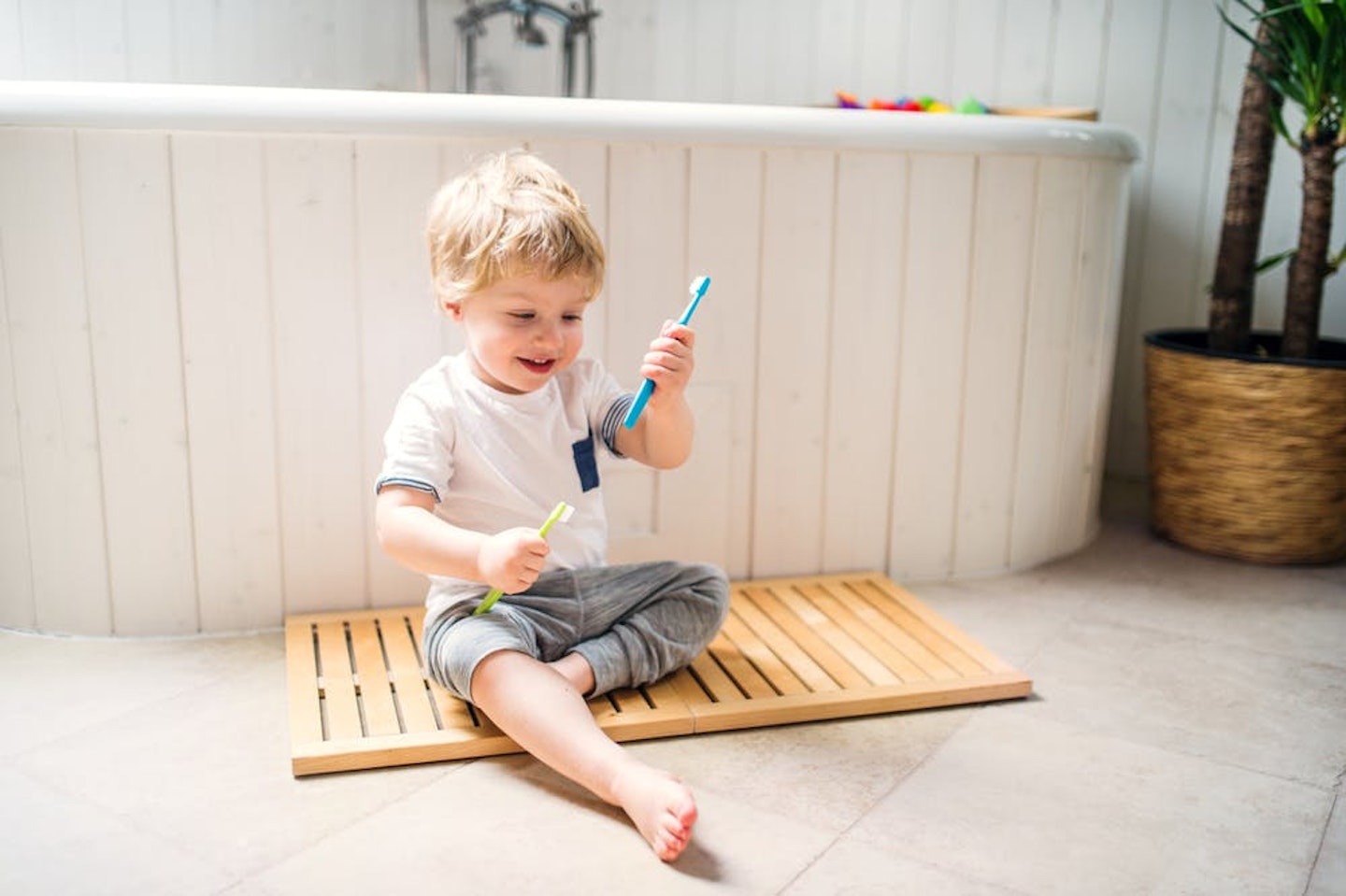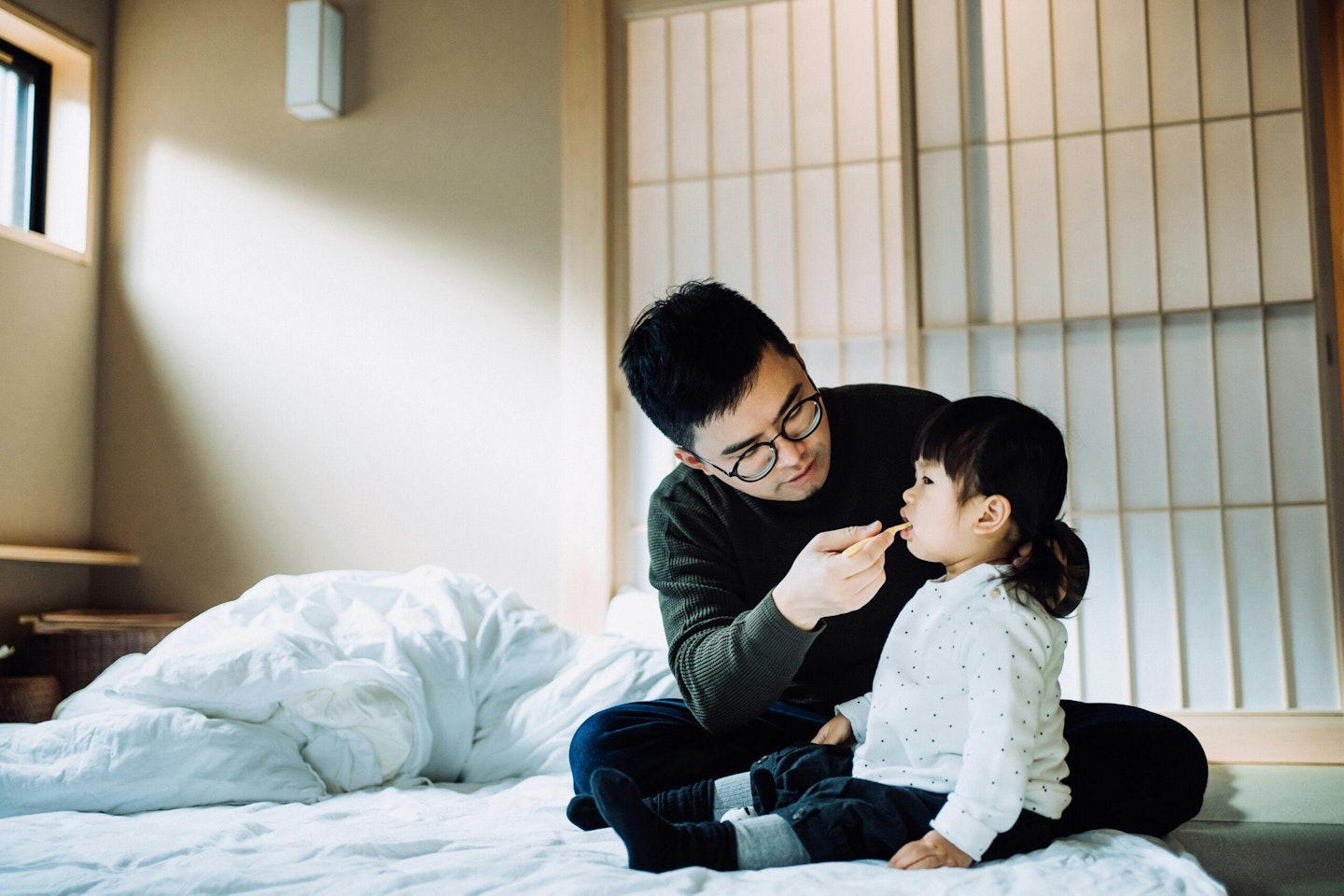Knowing how to teach your child to brush their teeth is an important part of building healthy habits from the start. After months of teething, it’s a joyful milestone when your baby’s first little teeth finally emerge. From the moment those pearly whites appear, it’s important to keep them clean and protect that growing smile. However, for many parents, brushing can quickly turn into a twice-daily struggle. The good news is, there are lots of simple ways to make toothbrushing a fun and positive experience for both you and your child, turning this routine into something you can both look forward to.
Start young
How to teach your child to brush their teeth? The key to establishing a good oral health routine is to start straight away, says Dr Claire Stevens, a consultant in paediatric dentistry. If you begin regular brushing when your child is a young baby, before they think about getting upset about it, you’re likely to get far less resistance.
But wait until your tot is older to get to grips with teeth brushing, and you may find you’re in for a battle. "With one in eight three-year-olds already having some form of decay, it is crucial to start thinking about your child’s oral health while they are still very small," says Claire.
Begin brushing teeth as soon as that very first tooth appears, using a toothpaste that contains fluoride. "Fluoride is a natural mineral that is found in bones and teeth," explains Claire. "Fluoride toothpastes help strengthen tooth enamel – the hard, outer layer – and prevent small holes, known as cavities, from forming."
Less toothpaste is more...
For babies and toddlers up to the age of three, use a flat smear of toothpaste, about the same volume as a grain of rice, advises Claire. You want to put enough toothpaste on the toothbrush to cover the top of the bristles. "The most important part of brushing is to deliver the fluoride to the teeth so that it can protect them from decay," says Claire. "Look for a toothpaste that has at least 1,000 parts of fluoride per million, marked on the packaging as 1,000ppm."
Start them with a minty taste from the get-go if you can. Many fruit-flavoured toothpastes don’t have enough fluoride to be suitable for older children, and making the switch from sweet-tasting flavours to tingly mint later on can be tricky. Aquafresh produces a good transitional range for children. Beginning with Milk Teeth 0-2 Years, they get progressively mintier with Little Teeth 3-5 Years, then Big Teeth 6-8 Years.
Go straight for the brush
Don’t feel under pressure to buy products intended to be used before toothbrushes, like wipes, gloves, and teethers with plastic bristles. "There’s no real evidence that these are effective," says Claire, "so just go straight for a proper toothbrush." Babies and toddlers need a small brush head that fits comfortably in their mouth and reaches all the little nooks and crannies.
The best toothbrushes for kids are clearly labelled with their intended ages. If in doubt, go for one aimed at a younger age range, as some children have relatively small mouths for their age. And, vitally, when picking the perfect brush, look for one you think will appeal to him, to make toothbrushing fun!
If you’re choosing an electric toothbrush for your toddler, opt for one with an oscillating head to efficiently remove plaque from your little one’s teeth. "But you don’t have to buy an electric toothbrush," says Claire. "They make it easier to do a good job, but it’s perfectly possible to keep a toddler’s teeth clean with a manual brush."
"Bamboo toothbrushes are a good option because of their green credentials," Claire adds. "You should replace your child’s toothbrush every three months, so with a plastic toothbrush, that can lead to an awful lot of waste throughout their childhood."
Be consistent
Cleaning teeth can often trigger tears and tantrums from your toddler – many see it as an invasion of their personal space, and teeth-cleaning tends to happen when they are already tired and grumpy. Refusing to let you brush their teeth is also a way for your tot to assert their independence. "If your toddler does decide they don’t like having their teeth brushed, don’t give up," says Claire. "Stick with it as part of their routine every single day. Even if it hasn’t been the most thorough or perfect brush, ensure a bit of brushing always takes place."
Ideally, you should aim to brush your tot’s teeth for at least two minutes, twice a day. But don’t beat yourself up if two minutes isn’t possible – do what you can. If your child is exhausted before bed, it might be 20 or 30 seconds – it is much better to do a quick brush than skip it altogether.
"Sometimes, brushing a baby or toddler’s teeth in the morning can be especially challenging," adds Claire. "But while evidence suggests that there are real benefits to brushing last thing at night, the other session can be at any time of the day."
Stay relaxed, don’t make it a battle, and try to make it as fun as possible. If you can manage that, you should both be smiling.

How to make toothbrushing a breeze
-
Hold your little one close and maintain eye contact while you brush their teeth so they feel safe and secure. Claire says, "Nestle them into the crook of your arm and make sure they are looking at you. If you’re right-handed, use your left hand to hold their hand and your right hand to brush their teeth."
-
Let your toddler watch you brushing your teeth. That way, they will see it is normal and want to copy you. Brush your teeth at the same time and show them it can be a fun and positive experience. Show them how you brush by doing small circular movements rather than brushing side to side.
-
Choosing a battery-operated brush with a favourite cartoon character can help win them to teeth-cleaning sessions.
-
Encourage them to concentrate on one section of their teeth at a time rather than randomly brushing all over. Make sure they clean for long enough—a good guide is to sing "Happy Birthday" (slowly) once for the top teeth and once for the bottom teeth.
-
When they clean them well, make sure you give them masses of praise for being so clever, and tell them how pleased the dentist will be.
-
Set a timer to ensure your toddler brushes for the full two minutes. Start by saying, "Ready, steady, go," and then cheer and give lots of praise when the timer goes off and it’s time to stop.
-
Try setting up a wall chart with a sticker for every time your child cleans their teeth well. After 10 stickers, they get a small toy or an outing with mummy.
-
Brush DJ is a free, NHS-approved app that plays two minutes of music for your child to brush their teeth to. Once they have finished, they will be rewarded with a smiley face and a round of applause. You can download Brush DJ from Google Play and Apple’s App Store.

"For many children, brushing teeth is boring," says Claire. Counteract this by making the experience as fun as possible and distracting them from brushing their teeth. Sing a song, play a game, or give them kisses and tickles as you brush. "Playing the Hey Duggee toothbrushing song works for many children," adds Claire. "If your child sees a character, they like brushing their teeth, they’ll try to emulate that."
If your child doesn’t want to stand in front of the sink to brush their teeth, don’t worry about it. Let them brush their teeth where they feel comfortable. This might be in the bath or floor – location isn’t essential.
Meet the expert:
Dr Claire Stevens CBE is a highly respected Consultant in Paediatric Dentistry, based at the University Dental Hospital of Manchester and serving Greater Manchester’s Health & Social Care Partnership. A graduate of Bristol Dental Hospital (BDS, 2000), she completed specialist training and earned an MPhil in dental erosion before being appointed a Consultant in June 2009.
Emily Gilbert is the Features & Reviews Editor for Mother&Baby. With a background in print and digital journalism, she has written extensively on pregnancy, fertility, perinatal mental health, and the best in baby and parenting products. A first-time mum to Theodore, Emily combines her professional expertise with personal experience, offering readers trusted advice and relatable insight. Specialising in product and travel reviews, she stays ahead of the curve on the latest parenting trends and is passionate about showing that life with a little one can still be full of adventure.
